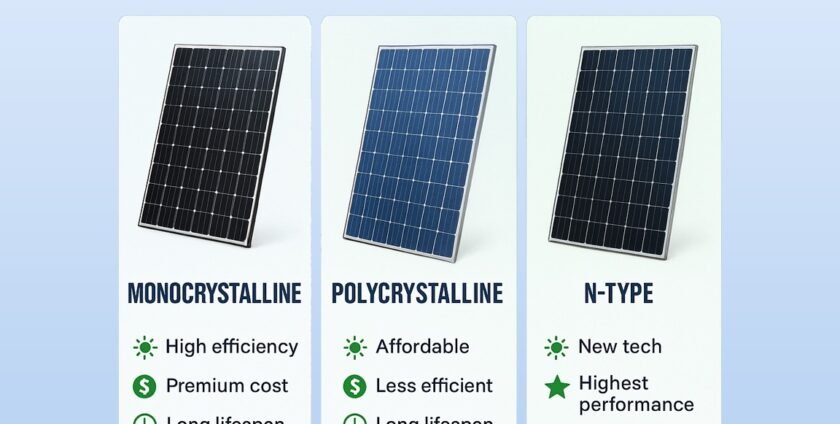
Monocrystalline vs. Polycrystalline vs. N-Type Panels—Which Is Best?
Introduction
Solar energy is becoming one of the fastest-growing renewable energy sources in Pakistan. With electricity costs rising and frequent load shedding, more people are turning to solar systems for reliable and affordable power. However, choosing the right panel can be confusing. The three most popular types of solar panels in Pakistan are monocrystalline, polycrystalline, and N-type panels. In this blog, we’ll explore their features, prices, and performance to help you decide which one suits your home or business best.
Types of Solar Panels in Pakistan
1. Monocrystalline Solar Panels
-
Appearance: Sleek black panels with rounded edges.
-
Efficiency: 18%–22%, the highest among common panels.
-
Lifespan: 25 years or more with a strong warranty.
-
Best For: Homes or businesses with limited roof space.
-
Pros: High efficiency, long-lasting, requires less space.
-
Cons: Higher cost compared to other panels.
2. Polycrystalline Solar Panels
-
Appearance: Blue-colored with a grainy surface.
-
Efficiency: 15%–17%, lower than monocrystalline.
-
Lifespan: 20–25 years.
-
Best For: Large rooftops, farms, or areas where cost is a major factor.
-
Pros: Affordable, reliable, widely available in Pakistan.
-
Cons: Lower efficiency, needs more panels to produce the same power.
3. N-Type Solar Panels (Next-Generation Technology)
-
Appearance: Similar to monocrystalline but with advanced design.
-
Efficiency: 20%–24%, higher than traditional panels.
-
Lifespan: Up to 30 years with slower performance degradation.
-
Best For: High-end residential, industrial, and commercial projects.
-
Pros: Excellent efficiency, better performance in hot weather, longer lifespan.
-
Cons: Higher price, limited availability in Pakistan compared to other types.
Price Comparison of Solar Panel Types in Pakistan (2025)
| Solar Panel Type | Efficiency Range | Average Price per Watt (PKR) |
|---|---|---|
| Monocrystalline | 18%–22% | Rs. 52 – Rs. 60 |
| Polycrystalline | 15%–17% | Rs. 45 – Rs. 52 |
| N-Type | 20%–24% | Rs. 65 – Rs. 75 |
(Note: Prices may vary depending on brand, supplier, and dollar exchange rate.)
Which Type of Solar Panel Is Best for Pakistan?
-
Monocrystalline Panels: Best for homeowners in cities where roof space is limited but efficiency is a priority.
-
Polycrystalline Panels: Best for people looking for budget-friendly solutions with large installation space available.
-
N-Type Panels: Ideal for those who want cutting-edge technology, maximum efficiency, and long-term performance despite the higher price.
Benefits of Choosing the Right Solar Panel
-
Lower electricity bills.
-
Energy independence during load shedding.
-
Long-term investment with quick payback.
-
Eco-friendly and sustainable energy.
-
Net metering support (sell extra electricity to the grid).
FAQs About Types of Solar Panels in Pakistan
Q1: What are the most common types of solar panels in Pakistan?
A: Monocrystalline, polycrystalline, and N-type panels.
Q2: Which solar panel is cheapest in Pakistan?
A: Polycrystalline panels are the most affordable option.
Q3: Are N-type solar panels available in Pakistan?
A: Yes, but mostly through premium solar suppliers in major cities.
Q4: Which panel type is best for net metering in Pakistan?
A: Monocrystalline and N-type panels provide higher efficiency for net metering setups.
Q5: How long do solar panels last in Pakistan?
A: Monocrystalline and polycrystalline panels last 25 years, while N-type panels last up to 30 years.
Conclusion
Choosing between monocrystalline, polycrystalline, and N-type panels depends on your budget, roof size, and energy needs. For city homes with limited space, monocrystalline is the smart choice. For cost-conscious buyers, polycrystalline panels are ideal. And for long-term, high-efficiency investment, N-type panels are the best option available in Pakistan’s solar market.
By understanding the types of solar panels in Pakistan, you can make an informed decision that saves money, provides energy security, and supports a greener future.
- By: IMH Technologies
- 0 comment

Leave a Reply